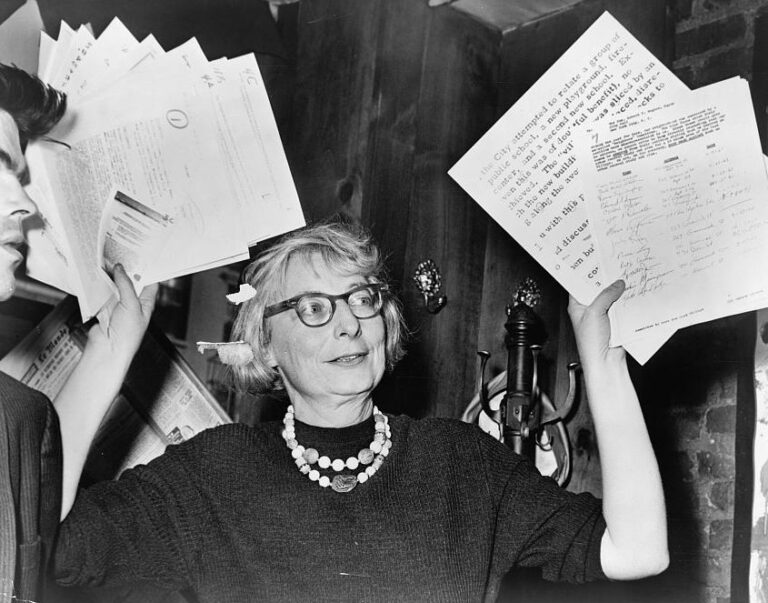Physical Address
304 North Cardinal St.
Dorchester Center, MA 02124
Physical Address
304 North Cardinal St.
Dorchester Center, MA 02124

This week on the Market Urbanism Podcast, I chat with Samuel Zipp and Nathan Storring on the wonderful new volume Vital Little Plans: The Short Works of Jane Jacobs. From Jacobs’ McCarthy-era defense of unorthodox thinking to snippets of her unpublished history of humanity, the book is a must-read for fans of Jane Jacobs. In this podcast, we discuss some of the broader themes of Jacobs’ thinking. Read more about the ideas discussed in this week’s episode: Pick up your copy of Vital Little Plans on Amazon. Mentioned in the podcast, Manuel DeLanda discusses Jane Jacobs in A Thousand Years of Nonlinear History. Read more about the West Village Houses here. The question of Quebec separatism is a fascinating—and under-considered—element of Jacobs’ work. Help spread the word! If you are enjoying the podcast, please subscribe and rate us on your favorite podcasting platform. Find us on iTunes, PlayerFM, Pocket Casts, Stitcher, and Soundcloud. Our theme music is “Origami” by Graham Bole, hosted on the Free Music Archive.

My guest this week is Anthony Ling. Anthony is founder and editor of Caos Planejado, a Brazilian website on cities and urban planning. He also founded Bora, a transportation technology startup and is currently an MBA candidate at Stanford University. He graduated Architecture and Urban Planning at Universidade Federal do Rio Grande do Sul and worked with Isay Weinfeld early in his career. Read more about the ideas discussed in this week’s episode: Be sure to check out Caos Planejado. Whether Portuguese is your native language or you’re interested in Brazilian urban planning issues, it’s a fantastic resource. Learn more about the emergent order of informal favela development. Everyone interested in urban planning should, at the very lease, read the Wikipedia article on Brasilia. Learn more about on-demand transit. Help spread the word! If you are enjoying the podcast, please subscribe and rate us on your favorite podcasting platform. Find us on iTunes, PlayerFM, Pocket Casts, Stitcher, and Soundcloud. Our theme music is “Origami” by Graham Bole, hosted on the Free Music Archive.

My guest this week is Sanford Ikeda, a professor of economics at SUNY Purchase and a visiting scholar at New York University. He has written extensively on urban economics, policy, and planning. Professor Ikeda introduced me to urban economics and urban planning when he gave a presentation on Jane Jacobs at a FEE summer seminar that I attended back in 2012. Here are a few of the topics we discussed in the episode: If you haven’t already, I highly suggest reading Jane Jacobs. The natural place to start is The Death and Life of Great American Cities. Her other books, including The Economy of Cities and Systems of Survival, explore topics ranging from economics to political philosophy. Professor Ikeda has written extensively on Jane Jacobs. You can read a nice overview here. If you would like to read more, click here for a paper he wrote on F.A. Hayek, Jane Jacobs, and the importance of local knowledge in cities. He is also a regular contributor to Freeman and Market Urbanism. We also discussed William H. Whyte’s famous documentary on public space, The Social Life of Small Urban Spaces. It’s well worth checking out. Help spread the word! If you are enjoying the podcast, please subscribe and rate us on your favorite podcasting platform. Find us on iTunes, PlayerFM, Pocket Casts, Stitcher, and Soundcloud. Our theme music is “Origami” by Graham Bole, hosted on the Free Music Archive.

When I was scheduling out the first few episodes of the Market Urbanism Podcast, it seemed natural to start with one of Market Urbanism’s favorite topics: the relationship between land-use regulation and rising housing costs in American cities. This week I sit down with Emily Hamilton, a regular Market Urbanism contributor and policy manager at the Mercatus Center at George Mason University, to discuss a recent paper she coauthored with Sanford Ikeda, “How Land-Use Regulation Undermines Affordable Housing.” The question I am left pondering: how can we convince homeowners—who have a large vested interest in the current system—to support land-use liberalization? Feel free to share your thoughts on this and other topics in today’s episode in the comment section below or with Emily and I on Twitter. Click here to listen to last week’s episode. Our theme music is “Origami” by Graham Bole, hosted on the Free Music Archive. A few general updates/requests: I am excited to announce that we are now on all major podcasting platforms: iTunes, PlayerFM, Pocket Casts, Stitcher, and Soundcloud. If you like what you’re hearing, go ahead and click “subscribe” and leave a review on your favorite platform. If your preferred podcast platform is missing, let me know in the comments below. How would you improve the podcast? Since my goal here is to provide nice content for the Market Urbanism community, I would like to hear your feedback on the show. Thanks for your patience as I familiarize myself with the technical side of podcasting and grow as an interview. Who is a guest you would like to hear on the show? Let me know in the comment section below. If you prefer to keep your suggestion private, feel free to direct message me on Twitter. As always, thanks for listening! We have a few exciting interviews lined […]

Phew! It’s finally here. After spending a good chunk of my summer researching podcasting, reaching out to potential guests, and recording my first few episodes, I am excited to announce the launch of the Market Urbanism Podcast. You can currently find the podcast on Soundcloud and PlayerFM. It will be available within the next few days on iTunes, Stitcher, and TuneIn. If there are other podcasting services you would like me to plug the RSS feed into, please let me know in the comment section below. Below, you can find a transcript. Given the amount of extra time it takes to transcribe the typical 30 minute episode, this probably won’t be a regular occurrence. That said, if anyone is interested in taking up this job, and getting some credit as an official member of the Market Urbanism Podcast team, message me on Twitter at @mnolangray. Stay tuned next week for a discussion with Emily Hamilton on the relationship between land-use regulation and housing affordability. Enjoy the show! Welcome to the Market Urbanism podcast, where we’re liberalizing cities from the bottom up. I’m your host Nolan Gray, a writer for Market Urbanism and a graduate student in urban planning. In this first episode I’d like to welcome you to the podcast by answering three questions you’re probably already asking yourself: First, what market urbanism? To give you the short answer, market urbanism is the synthesis of classical liberal thought with urban planning and policy. On the market side of the term, we place a lot of value on empowering individuals, recognizing the importance of economic liberty, and celebrating the complex spontaneous orders that organize human life. On the urbanism side of the term, to put it simply, we love cities. We’re interested in understanding what makes for bustling streets, healthy neighborhoods, and prosperous […]